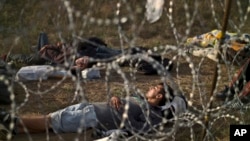A senior United Nations official warned that Europe's hardening attitude toward refugees and migrants is threatening the unity of the European alliance.
Peter Sutherland, the U.N. secretary-general's special representative for international migration, said he is alarmed at the growing hostility and xenophobic sentiments European politicians have expressed about people fleeing war and persecution.
The nationalistic and racist slogans heard since refugees began sweeping across Europe are deplorable, he said.
After the collapse of the Iron Curtain a quarter-century ago, seen at the time as the end of a Europe divided by borders, the U.N. official said it is particularly sad to see razor-wire fences reappearing at some border areas to bar immigrants.
"The recreation of borders challenges the whole integration of the European Union,” Sutherland said. “More particularly, it challenges the moral responsibility of states to help refugees to provide asylum."
Far-reaching concerns
Sutherland’s concerns extend to the wider migrant community, since focusing exclusively on refugees overlooks the desperate needs of what he calls "survival migrants." These include people escaping famine, poverty, natural disasters and other severe challenges that are putting their lives at risk.
These people, too, deserve asylum, the migration chief said.
Sutherland said he was astonished that a conference for Syrian refugees in London on Thursday brought in pledges of $10 billion in assistance. That money, he said, will provide better health, education and, in many cases, jobs for many thousands of Syrian refugees in Jordan, Lebanon and Turkey.
The pledges of international support will make life more tolerable for the four million Syrians living in these frontline states, but Sutherland told VOA he does not believe it will stem the flow of refugees seeking sanctuary in Europe.
"I do not think that the flow of migrants into Greece from Turkey or from other points in the Mediterranean is going to be substantially altered,” he said. “That flow will continue. So there are people — many — who will want to get to Europe."
Benefit of influx
New estimates from the International Organization of Migration bear this out: More than 74,500 Mediterranean migrants so far have arrived in Italy and Greece, a record number for this time of year.
With a population of more than one-half billion, Sutherland said Europe can easily absorb more than one million refugees and migrants. Furthermore, he added, given falling birth rates in Europe, a tide of migrants could benefit the entire region.





